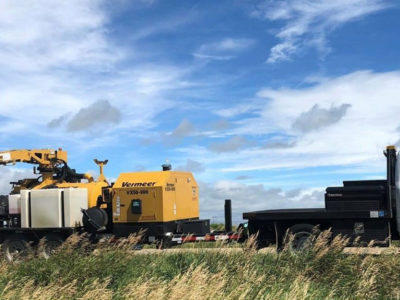Vacuum excavators aren’t just for utility contractors. Many city municipality departments are also discovering the versatility of these powerful soft digging machines for their own utility work, as well as many additional applications to help city crews work efficiently.
For example, in Webster City, Iowa, a small rural community of just over 8,000 residents, their recently purchased McLaughlin VX50 trailer vacuum excavator is being used for everything from traditional potholing to digging holes at the city cemetery.
According to Webster City’s electrical utility supervisor, Adam Dickinson, the city is working on a multiyear initiative to move all of the city’s electrical lines below ground, and his crews are responsible for the bulk of the work. “To support these efforts, we added a horizontal directional drill (HDD) to our fleet as well as a vacuum excavator,” Dickinson explained. “After a few years working with our original system, we determined it was an appropriate time to upgrade to the VX50 trailer vacuum excavator we have now. The first system we had was fine, but this one better supports our needs, helps our crews work safely, and is a bit more versatile than our previous one.”
The right configuration
The municipality team’s upgrades to their new trailer vacuum excavator included reducing the size of the spoil tank and adding a hydraulic boom to aid with the vacuum excavator hose. “We went with a 500-gallon (1892.7-L) spoil tank on our vac, which was smaller than what we had before, because transporting weight was becoming a bit of an issue for us,” explained Dickinson.
The city’s previous system also didn’t have a hydraulic boom, and according to Dickinson, this addition has been a real game changer. “After owning a vacuum excavator with a hydraulic boom, I don’t think there is any way we would go back to one without it,” he said. “The hydraulic boom keeps our crew working efficiently throughout the day. Also, the boom helps the operator stay cleaner.”
One accessory that Dickinson did not get but plans to add in the future is a hotbox that would allow his team to work with hot water to enhance digging in frozen ground conditions. “When we got the vac, I didn’t think we needed it, but after going through one winter and being surprised by how often our team or another city department used the system, it certainly would come in handy in the colder months. We’ll be adding it soon,” he said.
Multiple uses
Webster City primarily uses its vacuum excavator to expose existing buried utilities before performing HDD work. It also supports the HDD crew as they’re suctioning up used drilling fluids. However, in addition to these traditional applications, other municipality departments borrow the Vermeer vac from time to time. “The street department has used it for cleaning out intakes,” said Dickinson. “When a water main breaks and there is an issue with a pump keeping up, they bring in the vacuum excavator to do the job.”
In addition to lending it out to other departments, Webster City’s electrical utility department enlists their vacuum excavator to aid with utility pole replacement work. “Whether it’s poles snapping off because of weather or needing to be replaced at regular intervals, digging up a pole can be a cumbersome process,” explained Dickinson. “And if there are buried utilities tying into a utility pole, it’s even more challenging. With the vacuum excavator, we can dig around a pole so we can pull it out of the ground without affecting other buried lines, which is a real challenge with an excavator or backhoe.”
The most unique application that Dickinson has seen the city’s vacuum excavator used for is digging holes at the city-owned cemetery. “In recent years, cremation and then burying the ashes at the cemetery has become pretty common,” he explained. “Since it gets pretty darn cold in Iowa, getting below the frost line isn’t easy — especially when a hole only needs to be 18 inches to 20 inches (45.7 cm to 50.8 cm) in diameter. The vacuum excavator is designed to do that for potholing applications, so it made a lot of sense to use it at the cemetery since we already have it in our fleet.”
Dickinson estimates that 80% of the time his Vermeer vacuum excavator is supporting the municipality’s HDD efforts. The remaining 20% consists of performing odd jobs around the city. One thing is for sure, though: As the department has discovered new ways to use their vacuum excavator, there isn’t much idle time for their little unit — and that’s precisely what every municipality should hope for with their equipment fleet.
For more information about adding a vacuum excavator to your city or company’s fleet, contact your local Vermeer dealer.
This article contains third-party observations, advice or experiences that do not necessarily reflect the opinions of McLaughlin Group, Inc. or its affiliates. Testimonials and/or endorsements by customers in specific circumstances may not be representative of normal circumstances experienced by all customers.
McLaughlin Group, Inc. reserves the right to make changes in engineering, design and specifications; add improvements; or discontinue manufacturing at any time without notice or obligation. Equipment shown is for illustrative purposes only and may display optional accessories or components specific to their global region. Please contact your local Vermeer dealer for more information on machine specifications.
Vermeer and the Vermeer logo are trademarks of Vermeer Manufacturing Company in the U.S. and/or other countries. McLaughlin is a trademark of McLaughlin Group, Inc.
© 2020 McLaughlin Group, Inc. All Rights Reserved.
